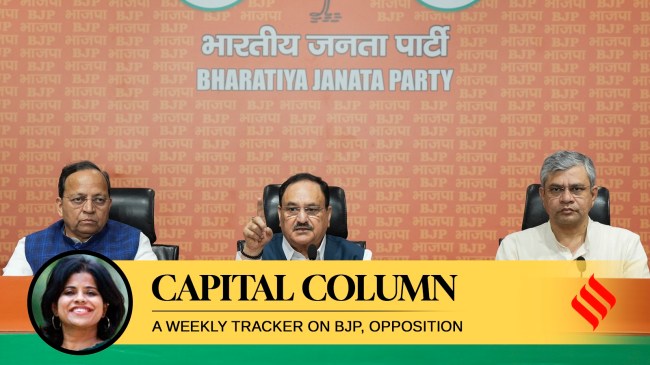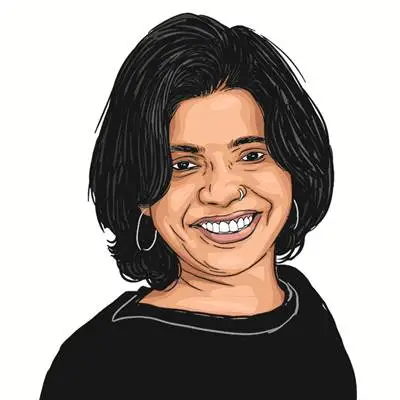Spring back in its step, BJP looks at the challenges, poll battles ahead
As Modi 3.0 completes its first year, the ruling party faces challenges on multiple fronts, from governance to politics.
 New Delhi: BJP National President Jagat Prakash Nadda, along with party leaders Ashwini Vaishnaw and Arun Singh addresses a press conference on "Viksit Bharat Ka Amrit Kaal: Seva, Sushasan aur Garib Kalyan ke 11 Saal", marking the completion of 11 years of the NDA government under the leadership of Prime Minister Narendra Modi, at the BJP headquarters in New Delhi, Monday, June 9, 2025. (PTI Photo)
New Delhi: BJP National President Jagat Prakash Nadda, along with party leaders Ashwini Vaishnaw and Arun Singh addresses a press conference on "Viksit Bharat Ka Amrit Kaal: Seva, Sushasan aur Garib Kalyan ke 11 Saal", marking the completion of 11 years of the NDA government under the leadership of Prime Minister Narendra Modi, at the BJP headquarters in New Delhi, Monday, June 9, 2025. (PTI Photo) While listing the achievements of the Narendra Modi government, BJP national president and Union Minister J P Nadda on Monday said it had achieved “unimaginable and unique” success.
As the Modi government 3.0 completed its first year, the upbeat mood was a far cry from the sense of disappointment that prevailed this time last year, when the party fell short of a simple majority and returned to power at the Centre with reduced strength. The BJP’s victories in three of the five Assembly elections since then — Haryana, Maharashtra, and Delhi — were one of the major reasons why the party appears to have got the bounce back in its step. The government also maintained its commitment to reforms, passing the contentious Waqf Amendment Bill and initiating the process of moving towards simultaneous elections.
However, several challenges remain on the political and governance fronts, with BJP leaders saying that the biggest test continues to be job creation. “If India’s emergence as an economic power should yield any lasting political outcomes, we have to have more jobs for the youth. FDI (Foreign Direct Investment) is stagnant and manufacturing is not going up despite cutting down corporate tax in 2019, how can we create jobs?” said a BJP MP, who did not wish to be named.
He also pointed out that the country was still lagging in skill development despite its potential to be the biggest provider of skilled workers.
The BJP has made efforts since 2014 to transform the youth into a committed support base. “But it remains a challenge. Without skill development and jobs, the youth will not be at your side for long,” said a leader.
Another leader said there was one more thing the party needed to do better to get into a position to influence the youth. “Even with the new education policy, the BJP still has not been able to influence the youth or academia with its core ideology. If we want to be the party that remains at the top, we need to see this as a challenge. We will not be able to influence the youth without it,” he said.
The volatility on the global stage is also a matter of concern for some as it has an effect not just on foreign policy but also on domestic politics and policy-making.
Political challenges
While the Opposition, which defied expectations in the Lok Sabha polls, stands fragmented, especially after Operation Sindoor, the BJP-led NDA remains in a position of strength. “The NDA will complete this term and win again,” Nadda said Monday.
But that does not mean the ruling alliance has it easy. BJP leaders admitted that managing coalition partners was an added responsibility, but said they do not envision any “big trouble” in keeping N Chandrababu Naidu and the TDP on their side. However, the JD(U), a crucial ally at the Centre as well as Bihar, where elections are due later this year, may not be as easy, according to party leaders.
“Their (JD-U’s) indecisiveness is the biggest issue. The ambiguity of (Chief Minister) Nitish Kumar’s party about its future could create problems for us. They handle the state and have a role in policy-making at the Centre. Who is going to be its leader will be an issue for the BJP too,” said a BJP functionary.
Bihar, the only Hindi heartland state where the BJP has never been able to form a government on its own, is crucial if the party has to maintain its pre-eminent position nationally. That requires the BJP to tackle the political situation in the state without wasting much time.
South and Bengal
After Bihar, the BJP also has to face electoral tests in the south, a region that has still not opened up for it and where the party has yet to shed its image as a party of Hindi-speaking, upper-class north Indians.
Next year, Kerala and Tamil Nadu go to the polls along with Puducherry. Making electoral gains and expanding are still uphill battles for the party in the two states, even though it has made some headway in recent years. In Tamil Nadu, the party has struck an alliance with the AIADMK, but party leaders admit it is going to be a tightrope walk there. The BJP has had to almost surrender itself to the AIADMK to stitch together an anti-DMK front.
In both Tamil Nadu and Kerala, the BJP has to take measures to counter the Opposition’s narrative about it being an anti-minority party. This will matter especially in Kerala, where the party has been trying to reach out to Christians to consolidate its position. The BJP’s newly appointed state president, Rajeev Chandrasekhar, has initiated several measures to shed the anti-minority image, with BJP leaders saying the party has to “work hard” to achieve this. In a recent interview, Chandrasekhar admitted the party had failed to counter such a narrative in the past.
West Bengal, another crucial battleground that is key to the party’s national agenda, also goes to the polls in 2026 and will be a big test of the BJP’s election machinery. The party has yet to reinvigorate its state unit, which is bogged down by factionalism and other internal crises. That the situation in Bengal is far from ideal is illustrated by the fact that the central leadership had not yet been able to appoint a state president or a new team to start poll preparations.
BJP insiders say that the absence of a strong second-rung leadership nationally and in state units, including in strongholds, is something that the party brass has to address going forward.
“We have to get new and fresh leaders for the future,” said a BJP leader. “As a dominant party, the BJP has to prepare for the future too. The time has come to make changes.”




